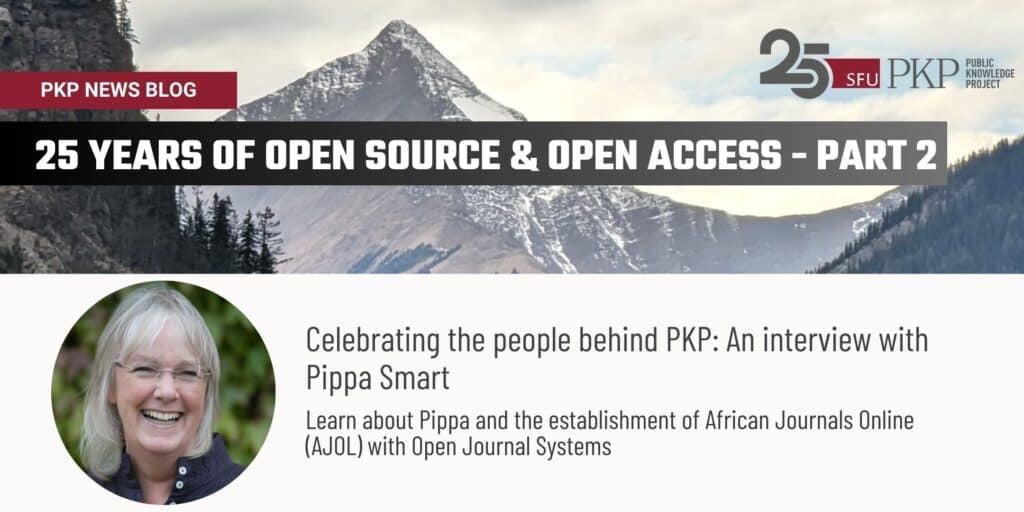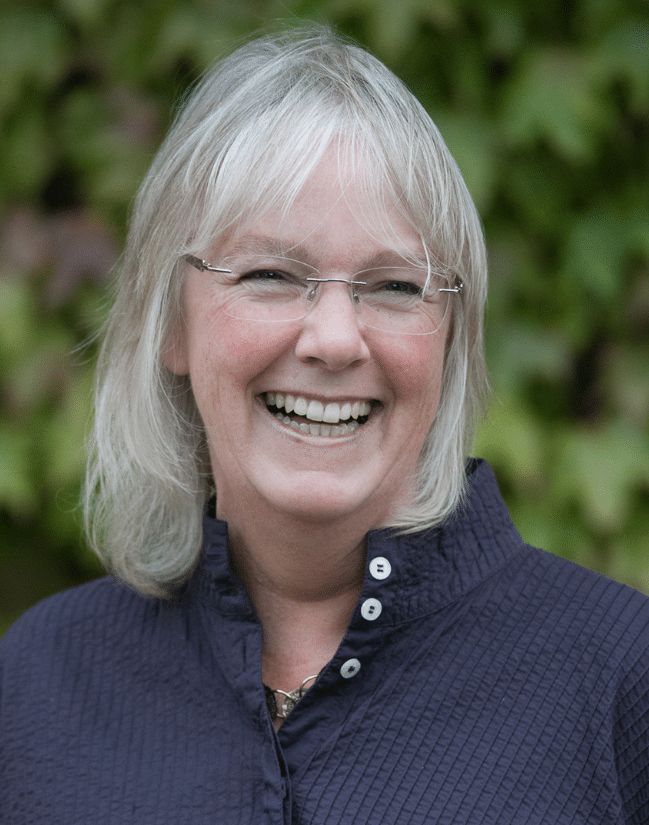
PKP’s 25th Anniversary interview series celebrates the history of the Project and those involved – Part 2 features Pippa Smart.
For a quarter of a century, community partnerships have been key in PKP’s work towards making research a global public good. Getting into the stories behind these relationships, we asked some of our partners to share what drives these connections.
We are grateful to Pippa Smart for taking the time to share these stories highlighting the importance of fostering open dialogue, shared vision, and diverse relationships on journeys to expand the reach of research around the world.
Let’s get to know you a bit. How long have you been working in this area? What have some of your milestones been?
I started working in this area after college (and a degree in publishing) way back in 1986 when I joined Blackwell Science (now Wiley) as a copyeditor. My career led me to run a production department in the 1990s when I oversaw the move from print to digital publishing, and later I worked as publisher for a portfolio of medical journals.
I worked 5 years for the International Network for Advancing Science and Policy (INASP) where I trained and supported journals and editors from less developed countries. I think my two major career milestones were starting the training programme for the Association of Learned and Professional Society Publishers, and developing the African Journals Online (AJOL) service. I’ve also trained almost 1000 editors during my career which has been a privilege.
What was your first memorable encounter with PKP?
I first encountered PKP in about 2003 when I was working for INASP and developing AJOL. I now cannot remember how we were introduced, but we needed a technology that could support online publication of multiple journals, was easy to manage and low cost. Open Journal Systems (OJS) ticked two of these boxes, but was only built to manage single journals at this time.
However PKP was keen to add the “multiple journals” element to it. The development wasn’t without its problems as we had to move over 1000 items from unstructured web pages into the OJS database, but both PKP and INASP rose to the challenge.
I also met John Willinsky several times during this period, with the most memorable meeting taking place in Beijing where we were both invited to a conference. We had a long discussion about the AJOL project and future collaboration whilst walking around the Summer Palace – what an amazing place to have a business meeting!
How were the relational aspects of working together important to achieving INASP’s mission?
INASP was a development organization, so we needed to work with other organizations that shared our philosophy of empowering researchers and institutions around the world to publish their research. PKP was a perfect partner in this regard since it had the same aspirations, it was non-profit, and was already working with editors and institutions in less advantaged countries and settings.
How did the relationship between INASP and PKP help improve the quality and reach of scholarship?
One of the attractions of OJS was that it was developed for open access journals, and it was important that AJOL provided open access to the journals that it hosted. Some of the editors and institutions were not yet fully supportive of OA at first, so part of the development was to provide information and advice on how to make OA work for the journal, and benefit the reach of their research.
Most of the work undertaken at INASP was to provide this information through workshops and one-on-one advice to editors. Establishing AJOL as such a large and influential publishing platform must surely have furthered acceptance and adoption of OA throughout the developing countries, since it led the way in providing a sophisticated publishing service for their journals.
In your experience, what have you learned about the nature of community in scholarly publishing?
Community is an often mis-used word, and there is no single publishing community. There are geopolitical and bias barriers to all research publishing, and building communities can be very difficult in situations where the logistics of retaining relationships (finding time for meetings, etc.) are challenging.
However AJOL did provide a platform of common experience for its journals and this model has gone some way to providing community hubs for the participating institutions and editors. It has the potential to build communities of practice and enable editors to meet others and in some situations this has been very successful.
What are you up to these days? Can you tell us a bit about your consulting business?
PSP Consulting is a consulting business for the scholarly publishing environment that I established in 2007. I work as an independent consultant providing advice, mentorship, and training to journal publishers and editorial groups around the world.
My career is now winding down, and having had an amazing time in the past few decades I am now taking on fewer new jobs and filling my time elsewhere. I have been honoured to receive the ALPSP award for Service to Scholarly Publishing, so I am inclined to think that I have reached the peak and it is time to step down!
Congratulations, Pippa, on this remarkable achievement, and thank you for taking the time to share your stories with PKP!
About Pippa Smart

Pippa Smart’s many influential roles have included establishing the African Journals Online (AJOL) in partnership with PKP’s Open Journal Systems, seven years as Editor-in-Chief of Learned Publishing, fourteen years writing the newsletter for the Association of Learned and Professional Society Publishers, Director for the World Association of Medical Editors (WAME), and President of the European Association of Science Editors (EASE). Learn more about Pippa.
